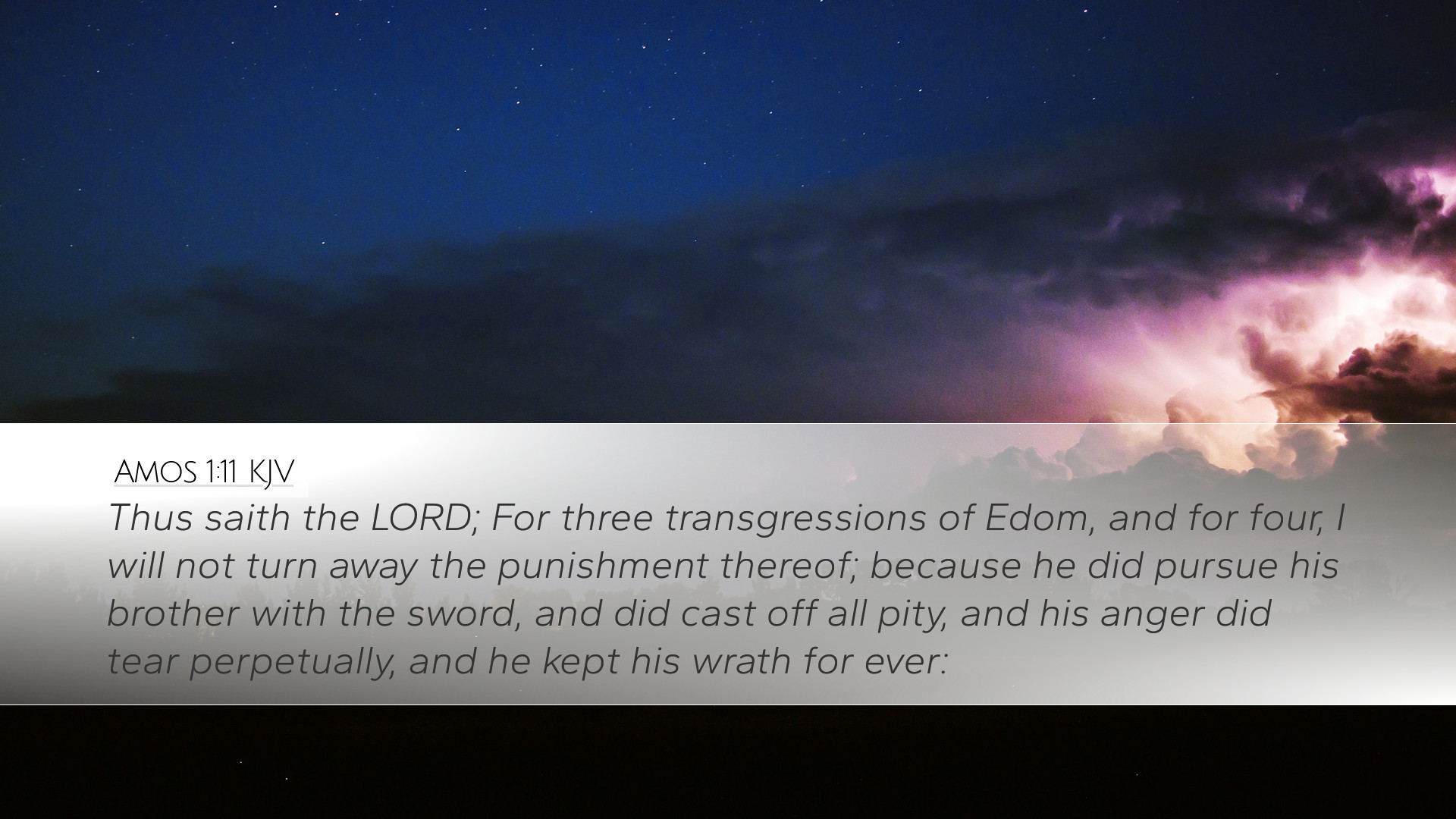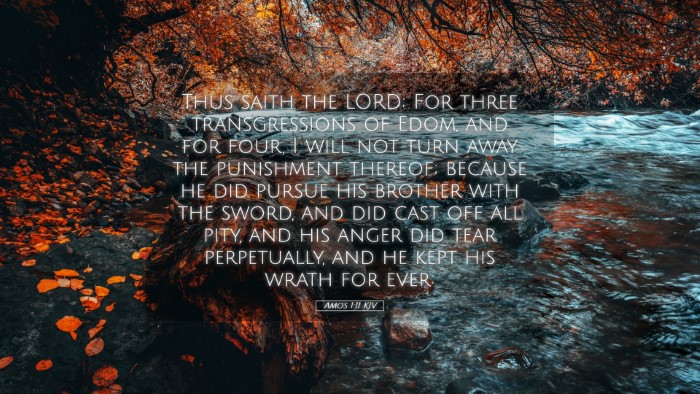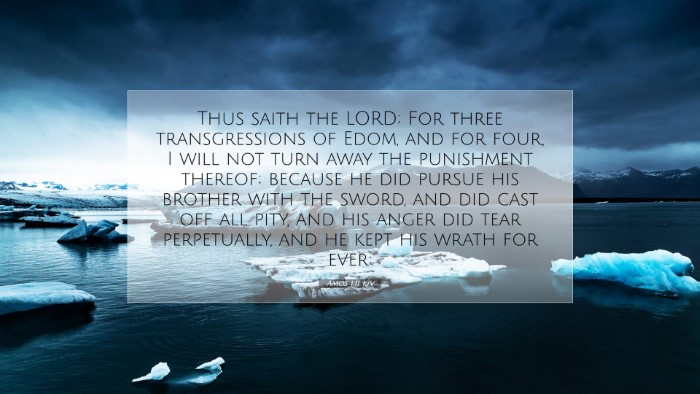Old Testament
Genesis Exodus Leviticus Numbers Deuteronomy Joshua Judges Ruth 1 Samuel 2 Samuel 1 Kings 2 Kings 1 Chronicles 2 Chronicles Ezra Nehemiah Esther Job Psalms Proverbs Ecclesiastes Song of Solomon Isaiah Jeremiah Lamentations Ezekiel Daniel Hosea Joel Amos Obadiah Jonah Micah Nahum Habakkuk Zephaniah Haggai Zechariah MalachiAmos 1:11
Amos 1:11 KJV
Thus saith the LORD; For three transgressions of Edom, and for four, I will not turn away the punishment thereof; because he did pursue his brother with the sword, and did cast off all pity, and his anger did tear perpetually, and he kept his wrath for ever:
Amos 1:11 Bible Commentary
Amos 1:11 Commentary
Verse Text: "Thus says the Lord: For three transgressions of Edom, and for four, I will not revoke the punishment, because he pursued his brother with the sword and cast off all pity; and his anger tore continually, and he kept his wrath forever." (Amos 1:11, ESV)
Introduction
The book of Amos, set against the backdrop of the Northern Kingdom of Israel during a time of economic prosperity and spiritual decay, offers a poignant critique of both social injustice and national arrogance. Amos 1:11 specifically addresses the nation of Edom, highlighting God’s unwavering justice and the consequences of enmity against His people. In this commentary, we delve into the insights of public domain scholars, demonstrating the theological and ethical implications of the verse.
Context of Amos 1:11
Before analyzing the verse, it is essential to understand its historical context. Edom, situated south of Israel, descended from Esau and had a longstanding animosity towards Israel, the descendants of Jacob. This age-old rivalry often manifested in hostility and violence, as Edom sided with Israel's enemies, exacerbating Israel's struggles.
Matthew Henry's Insights
Matthew Henry emphasizes the gravity of Edom's transgressions against Israel. He notes the phrase "for three transgressions, and for four," indicating an accumulation of sins that had prompted divine judgment. Henry elucidates that God’s forbearance has limits, and this verse illustrates the point where Edom’s sins were fully realized, leading to inevitable retribution.
Albert Barnes' Commentary
Albert Barnes focuses on the specific sins of Edom as outlined in this verse. He explains that Edom's violence towards Israel is representative of its broader disregard for compassion and justice. Barnes comments, "He pursued his brother with the sword," signifying not just physical violence, but a deeper betrayal of kinship and moral obligation. This pursuit is indicative of Edom's persistent aggression, which ultimately evokes divine wrath.
Adam Clarke's Analysis
Adam Clarke provides historical context to the transgressions of Edom, arguing that their actions were rooted in a refusal to acknowledge their shared lineage with Israel. Clarke posits that Edom's hostility was fueled by jealousy and resentment, notably during Israel's times of vulnerability. He also emphasizes the phrase “and cast off all pity,” illustrating a complete lack of empathy and humanity in their dealings with Israel, marking a profound moral failure.
Theological Implications
This verse reveals several theological truths. Firstly, it confirms God’s justice; He responds to sin with righteous judgment. God’s unwillingness to revoke punishment makes clear that divine justice is absolute and serves as a warning against persistent unrepentance. Secondly, it emphasizes the importance of brotherhood and interrelation among nations, implying that betrayal of one’s kin incurs profound moral and spiritual consequences.
Justice and Retribution
In addressing divine retribution, it is vital to consider God’s character as both just and merciful. The decision to bring punishment upon Edom reflects God's commitment to justice, particularly for the oppressed. This reinforces the principle that God does not overlook wrongdoing, irrespective of the guilty party's status or power.
Brotherhood and Responsibility
Amos 1:11 also underscores the theme of brotherhood. As descendants of Isaac, both Israel and Edom share familial ties, meaning Edom’s aggression towards Israel is particularly egregious in God’s eyes. This notion of familial responsibility resonates throughout Scripture, illustrating the expectation of kindness and solidarity amongst peoples connected by lineage.
Practical Application for Pastors and Theologians
This text invites pastors and theologians to reflect on their roles in confronting societal injustices. The morality of nations and communities reflects their adherence to divine principles. Thus, leaders are called to remind their congregations of their obligations to uphold justice, not only in spiritual matters but in everyday interactions, as they mirror the nature of God.
Reflective Questions
- How does the concept of divine justice shape our understanding of contemporary conflicts?
- In what ways can we, as communities of faith, demonstrate compassion towards those we may perceive as ‘enemies’?
- What lessons can modern nations glean from Edom's judgment to avoid similar pitfalls?
Conclusion
Amos 1:11 serves as a somber reminder of the consequences of hatred and hostility. The insights of Matthew Henry, Albert Barnes, and Adam Clarke enhance our understanding of the implications of Edom's actions and God's response. Their reflections beckon both individual and collective introspection in adhering to the principles of love, justice, and familial obligation. By doing so, we remain steadfast in our commitment to reflect God's character in our lives and societies.


